|
| By: Sha - at June 14, 2013 |
The Best Ways to Speed Up a Slow Computer
 Many people are frustrated with their slow computers, even computers that are
expensive and new from time to time get bogged down from usage. It is a problem
for hundreds of thousands of people who need to use computers at home or at
work. Personally speaking, it can be very frustrating dealing with a slow
computer. The good news is that there are simple ways to get rid of this problem
and make your computer run faster; just like it was new. In fact, one does not
need to be an expert to speed up a slow computer. You can do it using some
simple but very effective techniques. This article will help you find the best
ways to speed up a slow computer. Many people are frustrated with their slow computers, even computers that are
expensive and new from time to time get bogged down from usage. It is a problem
for hundreds of thousands of people who need to use computers at home or at
work. Personally speaking, it can be very frustrating dealing with a slow
computer. The good news is that there are simple ways to get rid of this problem
and make your computer run faster; just like it was new. In fact, one does not
need to be an expert to speed up a slow computer. You can do it using some
simple but very effective techniques. This article will help you find the best
ways to speed up a slow computer.
Have you ever wondered why some PCs, ones that are older than your PC that
you bought recently, are faster and more efficient? You may also complain about
how fast it used to start up when it was new, but now you pull your hair out
waiting for it to start up or just doing routine tasks. Yes, it is true some PCs
will take even ages to start up. Believe me, I have been there and I have
learned some very easy and simple techniques to solve this problem. Keep in
mind, in most cases it's not your computerís hardware that is the root of the problem. I
assume that this will be very good news for you. Let us understand the causes
and solutions for the problem.
The Most Common Causes for a Computer Slowing Down
The problem with a slow computer lies with changes that occur to the software
that is installed and running on the computer. If you are using your PC daily,
then it runs loads of programs, websites, and performs various tasks at your
command. Not to mention the programs or tasks run by the PC and its operating
system. What this means is that the computer inevitably starts to slow down. In
most cases, the hardware of your computer is OK and it can be restored to its
original state once certain things are done to get it running correctly again.
You can keep it in fast and excellent running condition with very little effort.
The most common causes of slowdown of your PC are:
Registry Errors
 Registry errors occur every time you or anyone using your PC loads
a program, game, or file when new registry instructions are updated with your PCís software registry.
These registry items remain on your PC even after the items have been removed.
Whenever you run your PC it tries to open and execute these instructions but it
cannot as the related programs cannot be found on your PC. This causes a
registry error. Naturally, your computer does a lot more work than it should
because of the errors, and this overload results in significantly slower
performance. Registry errors occur every time you or anyone using your PC loads
a program, game, or file when new registry instructions are updated with your PCís software registry.
These registry items remain on your PC even after the items have been removed.
Whenever you run your PC it tries to open and execute these instructions but it
cannot as the related programs cannot be found on your PC. This causes a
registry error. Naturally, your computer does a lot more work than it should
because of the errors, and this overload results in significantly slower
performance.
Spyware and Viruses
Spyware and viruses are malicious programs that get on to your computer and
collect your personal information without asking for your permission. They can
put your personal information at risk by collecting it from the websites you
visit. By copying the information you enter on certain websites like your bank
card or credit card information, social security number, or mailing address from
forms on the sites, these programs hope to steal your information or at the very
least use it for marketing purposes. Spyware seriously hampers your computerís
performance. Spyware and viruses can change the default browsers' settings or
search engine of your computer, use your email program to send out spam or junk
emails to other email addresses, track your web surfing habits, and show your
targeted advertising on the Internet in addition to stealing your personal
information as the worse case scenario.
Spyware and viruses get onto your PC when you visit different websites. They
are loaded on your PC through files that you download as attachments from
emails, or from the Internet. These viruses and spyware can take up a lot of
your computerís power and slow down your computer significantly.
How to Speed Up My Slow Computer?
You can quite easily repair and fix the registry errors on your PCís hard
drive, and remove viruses and spyware using a good anti-virus and spyware
software program to make your computer run faster. There are a few more simple
and easy ways to speed up your computer. Read on to find the solutions described
below.
Solutions to Registry Errors
You should never download any kind of free software programs from any
websites or companies online that you do not know well enough or trust. Never
download software programs like emoticons, screensavers, and similar programs
from free websites. You should never open any attachment from an email unless
you know and trust the sender 100 percent. It is always helpful to keep a good
anti-virus and spyware removal software running at all times on your PC.
Solutions to Spyware and Anti-Viruses
To fix the registry errors you can do a search on Google to find a reputable
registry cleaner program. Registry cleaners are advisable to use to help
speed up a computer. When fixed, your computer
will be simply much like it was when you bought it and the increased performance
will be substantial.
Free Up Disk Space
You can speed up the performance of your PC by removing unnecessary and
unused files, temporary Internet files, idle icons, optional components,
installed programs that you no longer use, and all other components that you no
longer use that may be still installed on your computer.
In a Windows based system, go to Start - Control Panel. From
there click on the "Uninstall a program", then uninstall everything you
do not need anymore.
Windows Control Panel:
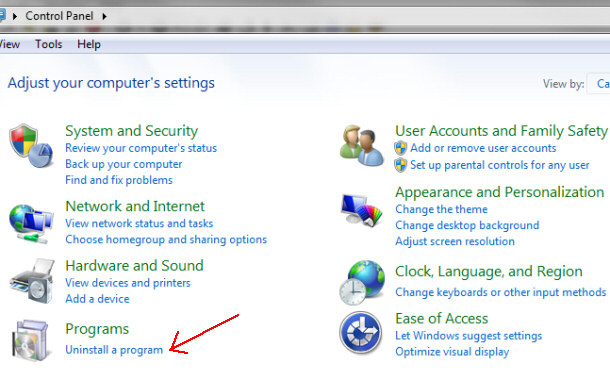
Eliminate Unnecessary Startup Programs:
If you are using a Windows based operating system, you can type in this after
using the Start - Run command: msconfig
A system configuration will pop up, from there, click on the Startup tab:
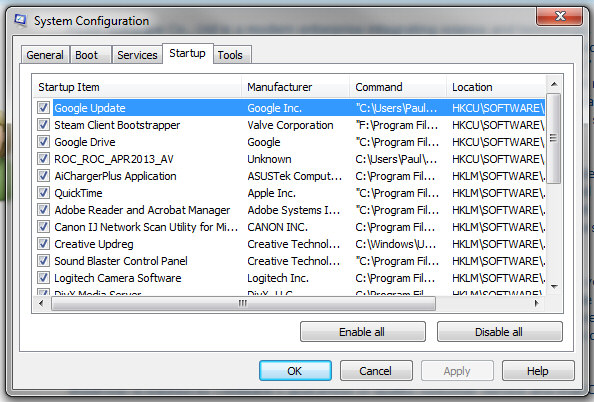
At the startup tab, look for anything unusual and you will most likely be
able to disable it by unchecking it. If you see anything by an
"Unknown" Manufacturer then it can most likely be disabled as well.
Just use common sense here when disabling items. By using this tool you
can dramatically speed up a slow computer.
Then click on the "Services" tab:
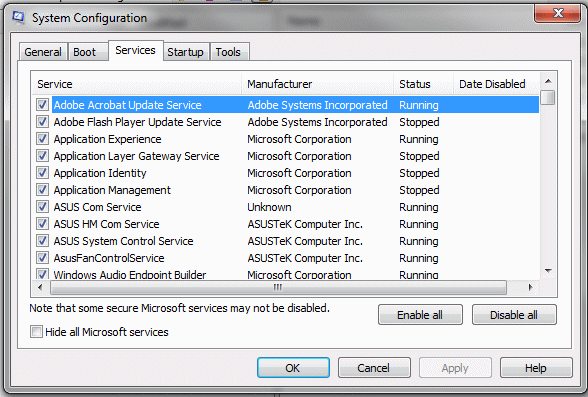
From the Services tab, click on the Hide all Microsoft services
and then just do the same thing here. Look for anything unusual or anything you
know you do not need and simply uncheck it. This again will help further
speed things up.
|
Windows Startup Folder:
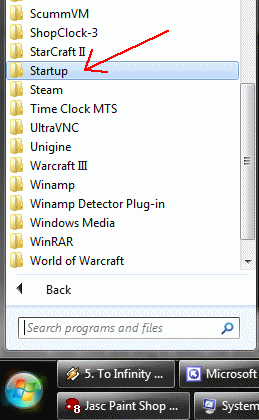
|
Remove Other Startup Items:
In Windows, click Start - All Programs, then find the "Startup"
folder. Any file in this folder will be called upon startup to run.
If you see anything unusual in here that you do not need, just delete it.
In most cases you will not need anything in this folder unless you know for sure
you use that program on a regular basis.
Repair and Fix Hard Drive and Disk Errors
It's possible to develop bad sectors on your computerís hard drive. Check the
hard drive at least once a month using appropriate error scanning tools to
detect any disk errors and fix the hard drive. It is incredibly easy to repair
and fix hard drive disk errors on your PC using the error scanning tool that come
with the operating system of your PC for free.
Defrag Your Harddrive!
You should also defrag your computer's harddrive a few times a year. Defragging
makes all the files on your hard drive more easily accessible by reorganizing
the files in order so they are quicker to grab by the hard drive, thus speeding
up any programs you want to load. Just about every OS comes with a built
in defrag tool.
NOTE: If your disk drive is a Solid
State Drive (SSD), then these drives do not need to be defragged, only regular
hard drives need defragged.
Upgrade Your Operating System and Internet Browser
If you are using any of the latest Internet browsers provided by different
companies, then upgrading the operating system is a good way to surf the
Internet faster. Keep your browser and operating system compatible to each
other. Using an outdated browser on a PC that is running on the latest operating
system will not give you an optimal surfing experience. Besides, it can slow
down your PC speed. The same goes for running an outdated operating system in
the hopes of trying to run a newer browser. A good rule is to make sure that
your device does not have any compatibility issues. In all cases, the
performance of your computer will be affected if there are compatibility issues.
So make sure your computer's OS and web browsers are up to date.
Blow the Dust out of your PC Case
I recommend blowing out the dust in your PC case about twice a year, doing so
increases the circulation to keep things cooler thus extending the life of your
PC's hardware. Heat sinks can get way to dusty and should be cleaned up:
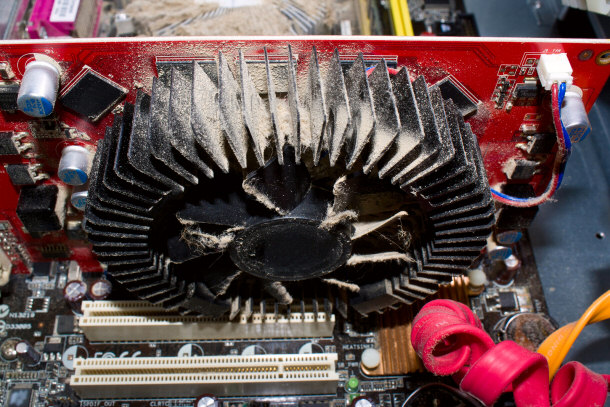
To blow the dust out I recommend using a compressed air canister, you can
find these on amazon . If your willing to spend a bit more money, then a
Metro Vac . If your willing to spend a bit more money, then a
Metro Vac can do wonders. I actually have one and I love it, the Vac can also be used on
stuff like keyboards as well.
can do wonders. I actually have one and I love it, the Vac can also be used on
stuff like keyboards as well.
Metro Vac:
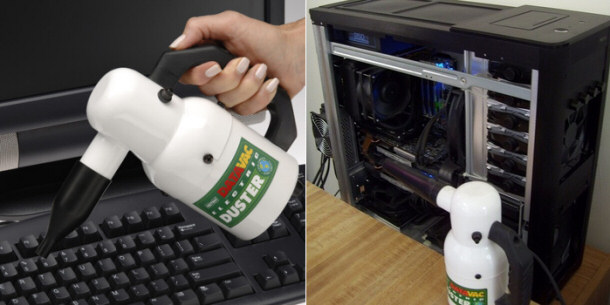
Don't Forget Software That Keeps Your Computer Clean
Making sure that you have a good anti-virus program is essential. I
personally use AVG Free for all
of my PCs and I also recommend others to use it as well. AVG Free is a
very simple yet very popular utility that does not bloat up your computer much
and does a really good job of getting rid of viruses and spyware, and it's free.
Another program I have been using and recommend it
Fix Cleaner, with
this program it gets rid of unnecessary items on your computer thus speeding
things up for you. I have been using this for a number of years now and
have been happy with the results. It's even a certified program by Microsoft, so you are rest assured of their
quality.
Conclusion
Follow the simple guidelines listed above, and make your slower computer run
faster, maintain its efficiency, and keep it running smoothly. I would also
strongly recommend that you must always check a pen drive before running on your
PC with any good and reliable anti-virus and spyware software program to see if
it contains any spyware and viruses. Never click on a web link, URL from an
unknown website, and never open attachments to your email and click on a link in
the email if you do not know and trust the sender 100 percent. Follow the above
guidelines and advice, and your computer will run faster and stay safe.
Computers
The Best Ways to Speed Up a Slow Computer
Why Network Security and Virus Protection is Essential |